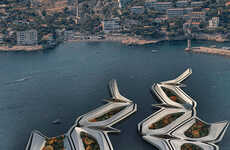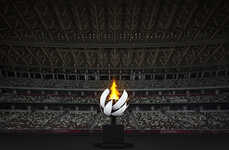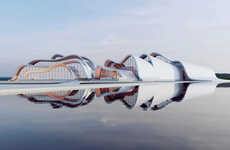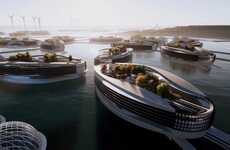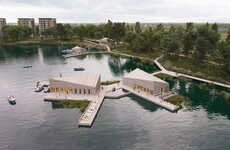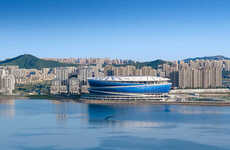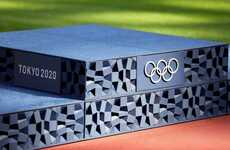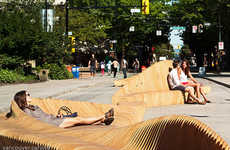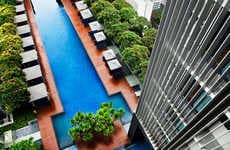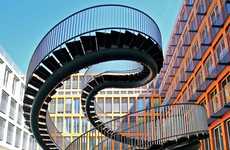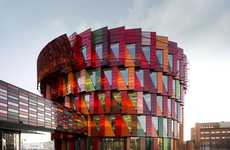
Floating Olympic Complex Brings the Games to New Heights
Amelia Roblin — March 12, 2011 — Art & Design
References: evolo.us & designbuzz
It's considered an achievement to host the Olympics for your country, but often the host city is the least excited about the whole undertaking. The Floating Olympic Complex proposed for the Rio de Janeiro games in Brazil aims to solve the problem of later unused buildings in these incredible inverted structures.
Pouring enormous amounts of money into new sportsplexes, residences and offices often amounts to underused infrastructure after the sporting events are over and the internationals head home. Andrew Chow Wai Tat, Tao Huang and Xue Liang Zhang of China and Malaysia received an honorable mention in the 2011 Skyscraper Competition for their proposal to leave existing urban fabrics untouched, thanks to these oversized mushroom structures. The Floating Olympic Complex will house stadiums, arenas, tracks and fields during the tournaments, and will later be used for housing and offices.
Pouring enormous amounts of money into new sportsplexes, residences and offices often amounts to underused infrastructure after the sporting events are over and the internationals head home. Andrew Chow Wai Tat, Tao Huang and Xue Liang Zhang of China and Malaysia received an honorable mention in the 2011 Skyscraper Competition for their proposal to leave existing urban fabrics untouched, thanks to these oversized mushroom structures. The Floating Olympic Complex will house stadiums, arenas, tracks and fields during the tournaments, and will later be used for housing and offices.
Trend Themes
1. Floating Architecture - Opportunities to create floating structures that serve as temporary sports facilities and can be repurposed for housing and offices.
2. Sustainability in Sports Infrastructure - Innovations in sustainable architecture for sporting events that reduce the need for building new structures from scratch.
3. Temporary Sports Facilities - New designs for temporary sports facilities that can be easily installed and removed without leaving unused infrastructure behind.
Industry Implications
1. Architecture and Construction - Designing and constructing complex, temporary structures for sporting events that can later be repurposed for residential and office use.
2. Sports Events and Management - Innovating sporting event planning with sustainability in mind, reducing waste and the need for new construction and infrastructure.
3. Real Estate Development - Taking advantage of repurposable temporary sports facilities to create new housing and office spaces, contributing to urban development and sustainability.
3.5
Score
Popularity
Activity
Freshness

